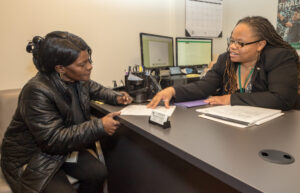
This blog post was written and submitted by Nechama Masliansky, a Senior SOME Advisor.
You probably know that SOME is more than a soup kitchen. You probably know that we take a Whole Person Care approach to assisting each person on their journey through our continuum of care. But you might not know that SOME is active in regional and citywide efforts to address gaps in access to employment, housing, transportation, food, and more.
The Brookings Institution recently reported that the DC region continues to lag behind most metropolitan areas in economic gains and economic inclusiveness. The region ranks 51st among 56 jurisdictions in racially inclusive access to education, health equity, access to capital, infrastructure developments, affordable housing, and workforce development. For example, they found widening gaps between white workers and people of color in employment rates, median earnings, and relative poverty rates. They found that the region has “pockets of extreme wealth and prosperity, as well as pockets of poverty,” and that “the region still has a fair amount of racial segregation.”
In addition, the Greater Washington Partnership states that affordable housing is hard to come by, and that at least 82% of renters are spending roughly a third or more of their monthly pay just to make the rent and related bills. That challenge can be particularly taxing for low-income families who are left with minimal funds to spend on food, clothing, education and other crucial expenses.
The Washington Business Journal writes: “The region’s numerous economic development-oriented organizations, local governments, nonprofits and others have attempted to design and implement changes to tackle inclusive growth in recent years, but the slow-going progress makes it clear that more needs to be done across this next decade.”
SOME’s staff is addressing these large-scale challenges not only with direct services, such as our Center for Employment Training, but also through services with DC Behavioral Health Association, Coalition for Housing & Economic Development, DC Initiative on Racial Equity and Local Government, DC Transportation Equity Network, and many other organizations.
Additionally, our director of policy and advocacy has been appointed as a member of the brand-new DC Commission on Poverty, where she will be able to contribute recommendations to alleviate many of the gaps identified above.
To learn more about SOME’s comprehensive work on these issues, sign up to receive our Advocacy Network updates.
